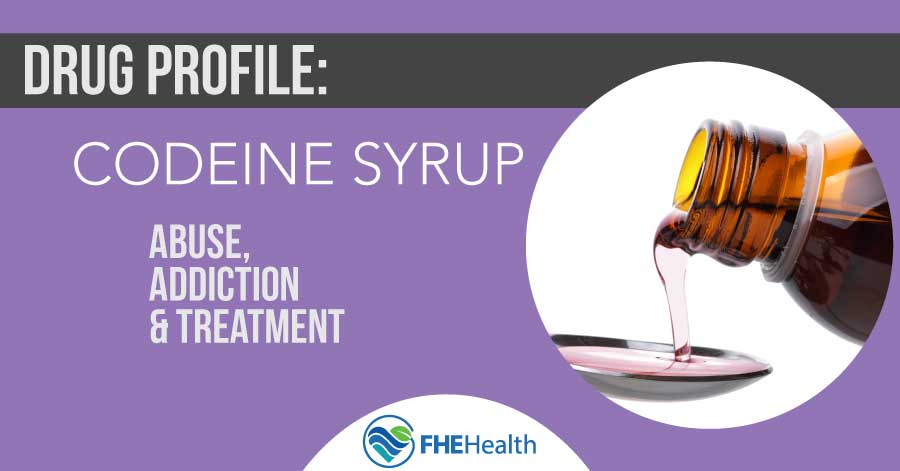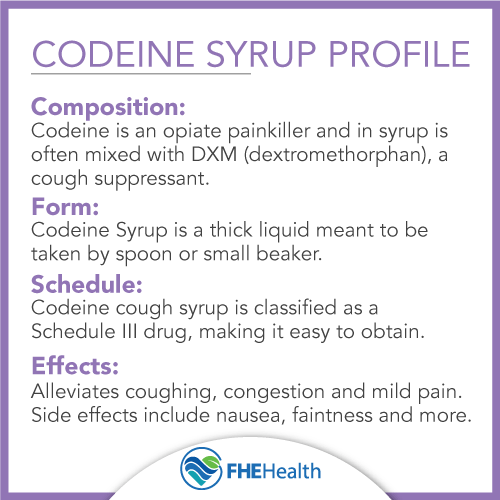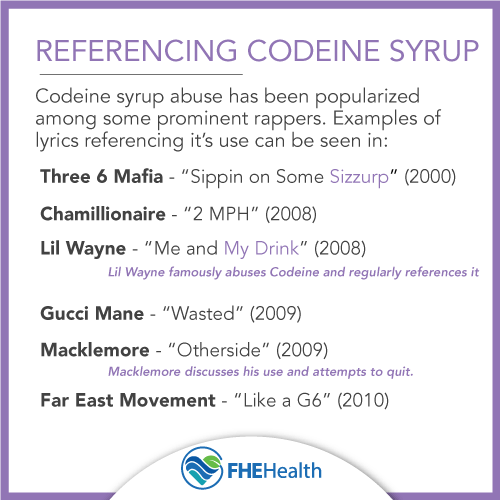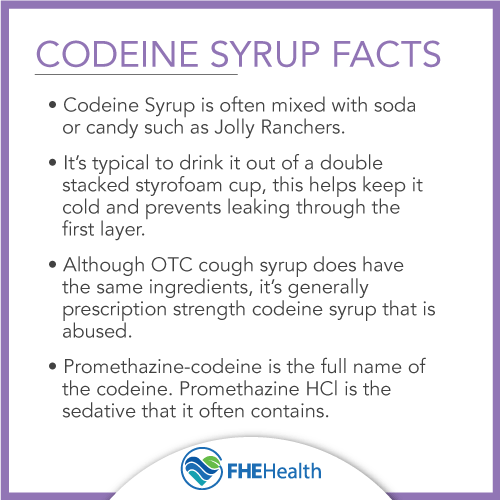
Codeine syrup is a narcotic that doctors prescribe to treat mild pain and respiratory complaints. It acts as a cough suppressant, so it has been featured in various prescription cough syrup brands for decades. Because this drug has been a prominent ingredient in cough syrups like Promethazine for so long and is a staple in the pantheon of pharmacological offerings, many people may not realize that codeine is an opioid drug, and, as such, can lead to abuse and addiction if misused. When prescribed for short-term use, codeine is generally safe; however, abuse of opioids (and opioid-containing drugs like codeine) is at the heart of the country’s drug addiction epidemic. Like other opioids, codeine is dangerous when taken in large doses, and is associated with a high rate of addiction.
What is Codeine
 Codeine is sometimes referred to as a “gateway opioid.” Technically, however, codeine is an opiate. This means it is naturally derived from the opium poppy. Opioids, conversely, are semi-synthetic drugs. The terms are often used interchangeably but there is a difference in the manner in which they’re created. In part, codeine’s use as a gateway drug may be because it has historically been prescribed by doctors frequently, owing to its efficacy. It’s not uncommon for people who have addictions to morphine or heroin to have first abused codeine before moving on to stronger opioids. While codeine syrup is effective for treating coughs and allergy symptoms as well as mild pain, long-term use of the drug carries a significant risk for dependency.
Codeine is sometimes referred to as a “gateway opioid.” Technically, however, codeine is an opiate. This means it is naturally derived from the opium poppy. Opioids, conversely, are semi-synthetic drugs. The terms are often used interchangeably but there is a difference in the manner in which they’re created. In part, codeine’s use as a gateway drug may be because it has historically been prescribed by doctors frequently, owing to its efficacy. It’s not uncommon for people who have addictions to morphine or heroin to have first abused codeine before moving on to stronger opioids. While codeine syrup is effective for treating coughs and allergy symptoms as well as mild pain, long-term use of the drug carries a significant risk for dependency.
Codeine cough syrup, while classified as a Schedule III narcotic, is not as strictly regulated as other opioids like morphine; for this reason, it poses a significant danger to users who may not appreciate its potential for abuse. When codeine is prescribed in tablet form to treat pain, it is listed as a Schedule II narcotic.
What is Unique About Codeine Cough Syrup?
Codeine is available in tablet form, but codeine cough syrup, which typically includes “DXM,” features a reddish or light purplish hue. DXM is a mild but effective cough suppressant. Historically, many codeine cough syrup brands added alcohol to the mixture, but this is no longer a common practice among pharmaceutical companies.
Unless the user obtains their codeine cough syrup from a pharmacist, it may be difficult to identify, as many cough syrups or drug syrups can be red or purple in color. During the 1990s, codeine cough syrup became a popular recreational drug that users combined with soda and a piece of Jolly Rancher candy. The syrup lent the soda a purplish hue— hence it’s nickname, “purple drank.” On the street, or when used recreationally, codeine cough syrup is also known as “sizzurp,” “schoolboy,” “cody,” “loads,” “syrup,” “lean,” and “pancakes.”
What Does Codeine Do?
Promethazine-codeine syrup or other codeine cough syrup brands are designed to alleviate coughing, congestion, and mild pain. When taking this medication, many people experience side effects like:
- Dizziness
- Nausea/vomiting
- Upset stomach
- Drowsiness
- Seizures
- Itching
- Sweating
- Constipation
- Feeling faint
- Slow heart rate
- Shortness of breath
Side effects can be more intense when the codeine syrup is mixed with alcohol. Mixing alcohol with any drugs can amplify drug effects and create a dangerous health situation, including death.
People on codeine medication may also need to avoid driving as the drug can impair their ability to operate a vehicle safely. A whole dose of codeine cough syrup typically stays in the system for about 16 hours. However, it may remain longer for some individuals.
Overview of Codeine Cough Syrup Addiction
 Codeine is emphatically an addictive substance. Codeine abuse and addiction are widespread. Although many people who take this drug as prescribed for a short period of time experience no dependency issues, people who take it for a longer stretch, or who take it in increasingly higher doses, are at risk of developing an addiction.
Codeine is emphatically an addictive substance. Codeine abuse and addiction are widespread. Although many people who take this drug as prescribed for a short period of time experience no dependency issues, people who take it for a longer stretch, or who take it in increasingly higher doses, are at risk of developing an addiction.
Codeine changes how the brain responds to pain or symptoms like coughing. When the drug enters the individual’s brain, it converts to morphine, binding to the central nervous system’s opioid receptors. The result is a reduction in the symptoms for which the codeine was prescribed, but also an increase in euphoric feelings.
People who abuse or who are addicted to codeine syrup are likely to experience some of the following signs symptoms:
- Memory loss
- Sedation
- Reduced coordination
- Euphoria
- Seizures
- Cravings
- Withdrawal symptoms
Of course, overdose is always a risk factor with an opiate or opioid. The drug affects an area of the brain that is also associated with the respiratory system. Taking too much can suppress the respiratory system, halting the breathing process, and leading to death.
Signs of Codeine Abuse
Many people who are addicted to powerful drugs like codeine may demonstrate mood swings. They may engage in a practice known as “doctor shopping,” in order to obtain prescriptions to the drug. People who are dependent on the drug may also obtain them on the street. According to some statistics, as many as 33 million people in the U.S. use codeine for non-medical purposes. DXM-containing codeine cough syrups remain a serious problem among teen drug users. Many people who abuse the drug feel anxious about having a ready supply on hand. They might also demonstrate signs like:
- Inability to moderate doses
- Finishing prescriptions early
- Avoiding friends and family
- Failing to meet work or school obligations
- Lying about drug use
- Stealing the drug or obtaining it from illicit sources
Short and Long-Term Effects of Codeine Addiction
Substance addiction is a chronic condition. People who are addicted to a drug like codeine experience strong cravings for the drug. If they don’t take it in a certain period of time, they’ll experience powerful withdrawal symptoms like headache, nausea, and even hallucinations. Abusing codeine in the short term is dangerous. As mentioned, overdose is always a threat. An acute experience with this drug can lead to overdose. It can also cause other physical and mental health problems like seizures or depression.
Long-term addiction to codeine is associated with deteriorating mental and physical health. Some long-term effects of codeine include:
- Gastrointestinal bleeding and other gastrointestinal problems
- Respiratory problems (i.e. shallow breathing)
- Fatigue
- Reduced sex drive
- Cognitive impairment
- Brain damage
- Anxiety
Treatment for Codeine Addiction
 People who are addicted to codeine can manage their disease with treatment. High-quality addiction treatment at respected drug treatment and mental health centers like FHE Health provide multiple treatment options and therapies for people suffering with a substance addiction.
People who are addicted to codeine can manage their disease with treatment. High-quality addiction treatment at respected drug treatment and mental health centers like FHE Health provide multiple treatment options and therapies for people suffering with a substance addiction.
Medical detox, either inpatient or outpatient, is usually a major component of addiction treatment. During detox, the individual is carefully weaned off of the drug. Healthcare providers will invariably prescribe medications to reduce the severity of withdrawal symptoms.
Medical detox only addresses the person’s physical dependency, however. Other treatments that address the psychological and behavioral aspects of addiction, those aspects that typically lead to relapse, help individuals learn how to manage their condition and cope with the triggers that led them to misuse codeine in the first place.
At FHE Health, addiction specialists meet with individuals to help them develop a customized treatment plan. After detox, treatment for codeine addiction usually involves individual and group counseling. Some people benefit from an inpatient stay, especially those with more severe and longstanding addictions. Other individuals prefer outpatient therapy so they can continue to work, care for their family, or meet other important obligations.
If you or a loved one is addicted to codeine cough syrup or another type of drug or alcohol, it’s essential to get treatment at an addiction treatment center that specializes in substance addiction. Few people ever manage to kick a drug or alcohol addiction without professional help and long-term support like aftercare. Contact FHE Health to learn more about its treatments, therapies, and support for addiction recovery.






